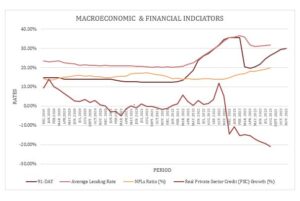The quantum of government borrowing in 2024 risks crowding out private sector investment critical for growth, analysts have warned in light of the budget statement and economic policy for the upcoming year.
The proposed 2024 budget aims to raise GH¢61.4billion to fund the deficit from the domestic market – representing over 99 percent of total financing for the fiscal year.
“The residual Net Domestic Financing will amount to GH¢61.4billion (5.8 percent of GDP), representing 99.3 percent of the total financing for 2024. This is expected to be sourced from issuances of debt at the short end of the domestic market,” Finance Minister Ken Ofori-Atta declared during the presentation.
Cumulatively, as of November 20, 2023, the Treasury has issued GH¢128.93billion on the money market, surpassing the GH¢119.77billion target. Investors tendered GH¢133.07billion during this period. Notably, GH¢22.95billion of the total issuances represented net issuance (new debts), aimed at supporting the 2023 budget due to government’s inability to access international capital markets.

Vish Ashiagbor, Country Manager for PwC Ghana, warned that consistently accessing such sums will inevitably shrink private sector access.
“It is worrying to see government regularly mopping up liquidity from the banking system through purchasing considerable volumes of Treasury bills at increasingly high interest rates,” Mr. Ashiagbor said while reviewing the budget.
“Undeniably, until the international financial market is reopened to the country, government has virtually no other option than to compete with the real sector for financial resources held by the banking industry,” he added.
With external finances still constrained, domestic banks are forced to plug deficits. But Ashiagbor said persistently draining liquidity leaves less affordable credit for companies to expand.
“If that persists, government’s short-term borrowing requirements will rob the private sector of opportunities – as they will be mostly crowded out of the credit market,” he warned.
Meanwhile, government forecasts 2.3 percent GDP growth in 2023 after growth of 3.2 percent in first-half of the year. However, reduced access to credit could hamper businesses and individuals which form the core tax base needed to spur economic expansion.
“The risk to government’s macroeconomic growth targets in our current high-interest rate environment (fuelled by government’s large appetite for borrowing from the short end of the money market) is obvious, as the earning power of the taxable base – businesses and individuals/households – will be weakened,” the Country Manager said.

Banks’ profit-surge masks struggling private sector
The country manager noted that while bank profits have jumped 43 percent this year, private sector lending has dropped 21 percent over the last year in real terms. The industry’s non-performing loans have also spiked from 14 to 20 percent of total lending since August 2022.
“This reflects struggles in the real economy and increased risk aversion from banks,” he said. With high-interest rates sustained by government’s substantial short-term borrowing appetite, analysts fear reduced investment and consumer spending power will undermine growth.
Adding his voice to the subject, Professor John Gatsi, Dean-University of Cape Coast Business School, suggested that concerns over the proposed Financial Sector Stability Fund could compound the private sector’s woes.
Mr. Ofori-Atta announced a government-funded US$500m cedi equivalent sub-fund called Fund A2, “Which will help to mainly recapitalise state-owned financial institutions and, to the extent feasible, provide some support for other indigenously-controlled financial institutions to improve their post-DDEP solvency”. This is in addition to a World Bank US$250m supported sub-fund called Fund A1, targetted at banks and SDIs that meet certain criteria required by the World Bank. Prof. Gatsi believes it requires a fairy-tale level of belief to expect government to meet its end of the bargain, considering its fiscal constraints.
“We believe the foreign-owned banks are in a better place, as they will be able to recapitalise far more easily through their network… however, the commitment from government will be hard to realise. The announcement might just be seeking to attract the World Bank component, because for the government of Ghana to dole out almost GH¢6billion to establish the Fund, given the financial situation and priorities of government, I do not foresee that happening,” he explained.
Already, the interbank weighted average lending rate increased to 27.31 percent for September 2023 from 22.05 percent in September 2022 – in tandem with increases in the monetary policy rate, which stands at 30 percent. Consequently, retail rates have adjusted upward, raising the average lending rates of banks which increased to 32.48 percent in September 2023. Additionally, the Ghana Reference Rate effective for November 2023 is 32 percent.
Prof. Gatsi believes that as a result of these factors, parliament in its debate on the budget must demand clarity on the roadmap to deficit financing as well as its impact on the real sector.
Those are the things that MPs must really scrutinise. We all know that due to the IMF programme BoG will not be financing the deficit; also, we cannot access the international market and our local debt market is not exactly buoyant,” he said.
Growth Strategy Investments Risk Repeating Past Mistakes
The 2024 budget outlines public investments in agriculture and technology to drive growth and jobs. However, critics argue schemes aiming to aid mass beneficiaries often waste funds.
“These interventions should have commercial orientations, not social protection aims – especially in an election year,” Mr. Ashiagbor said.
He advised first investigating the economic impacts of existing programmes before allocating more spending. Some GH¢61billion is already slated for such government growth plans in 2024.
With debts still unresolved and private sector prospects hampered by persistent liquidity mop-ups, PwC says government must strike a balance between its financing needs and nurturing business growth.
“If borrowing continues unchecked, government risks choking the private sector – which remains key to the long-term growth being pursued,” the country manager stated.










